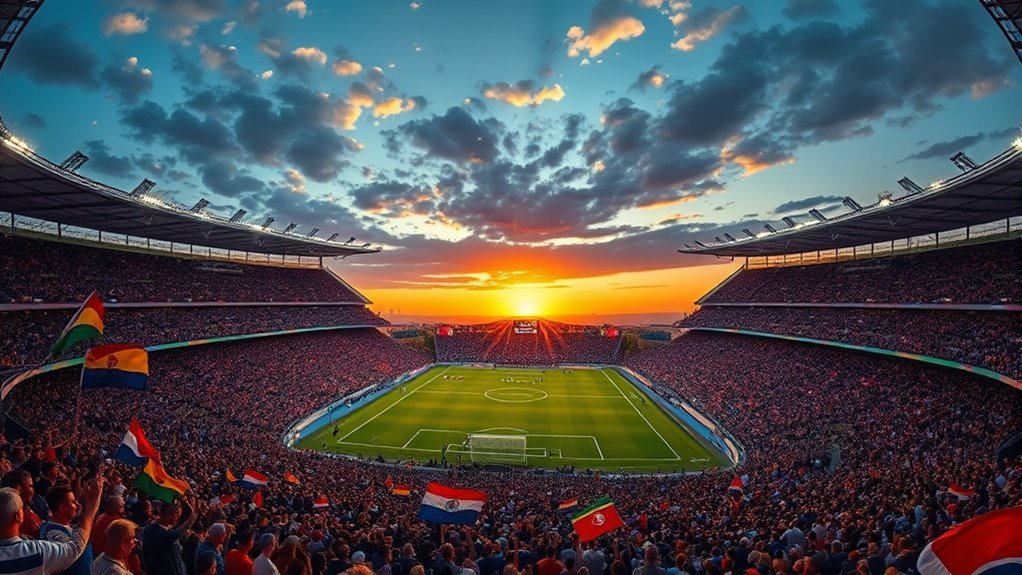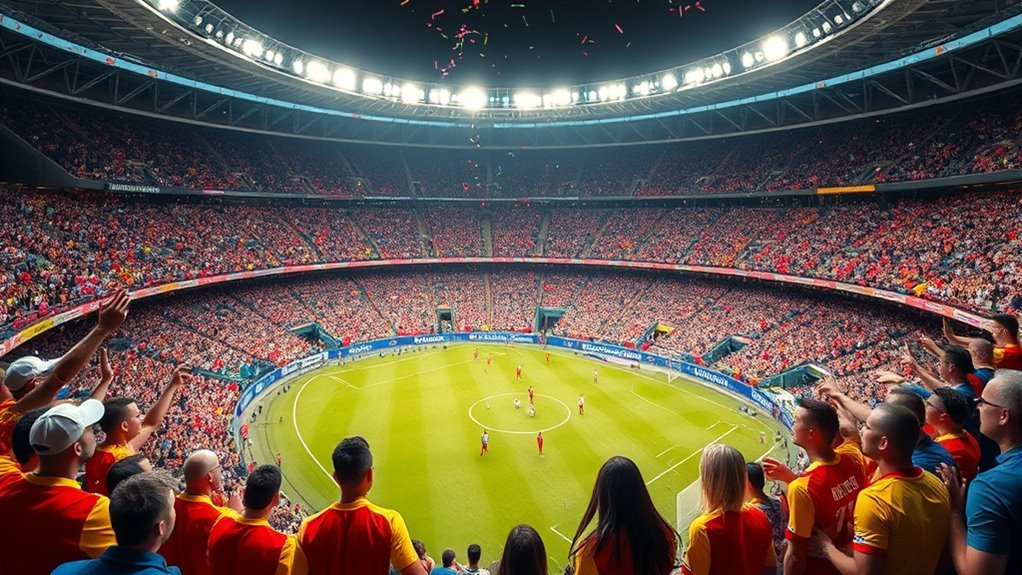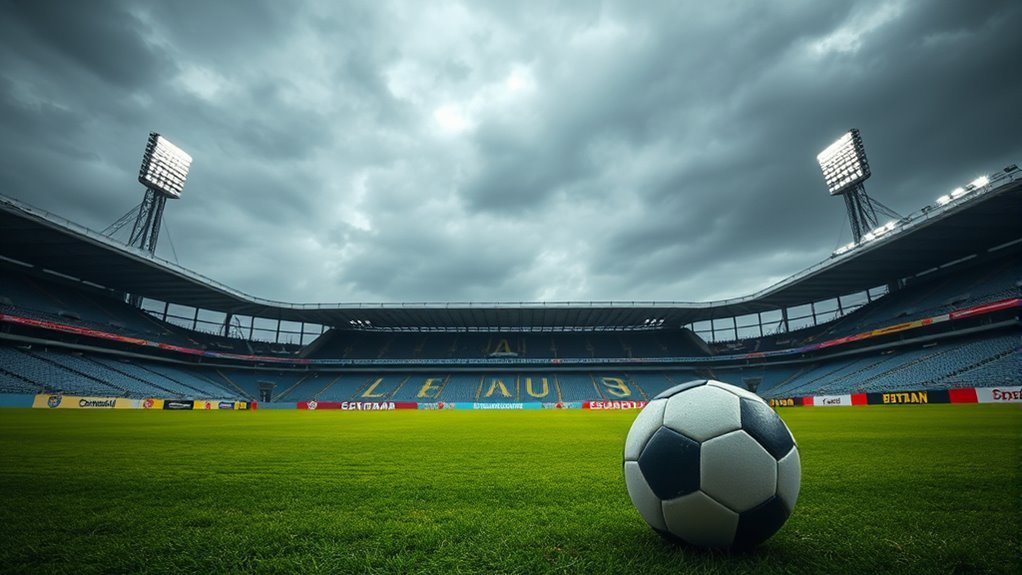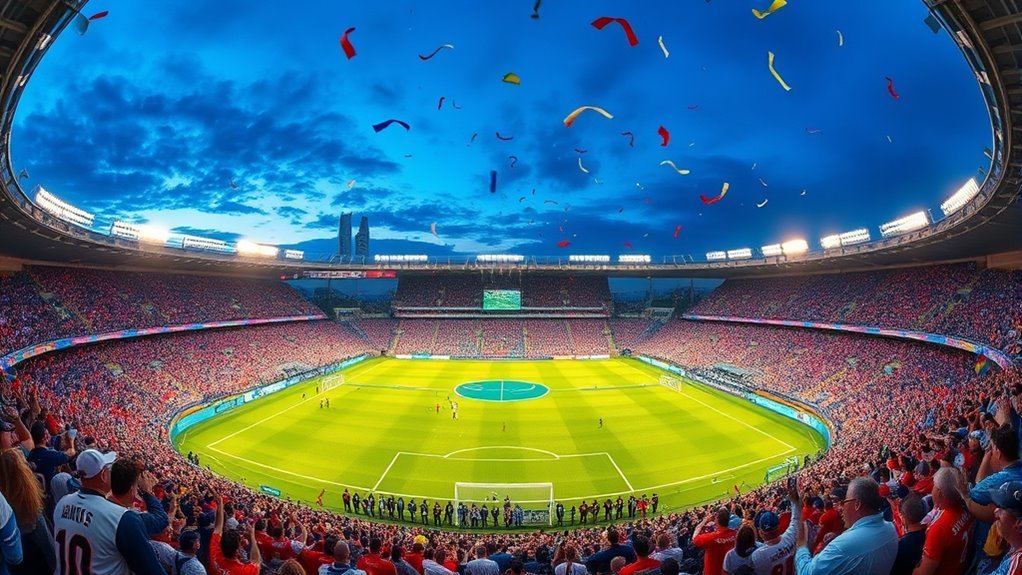As of now, the teams that have qualified for the FIFA World Cup 2026 are the United States, Canada, and Mexico, since they’re the host nations. This tournament will be the first to feature 48 teams, making it a historic event for global football. You’re in for an exciting competition where more nations get to showcase their talent. If you’re curious about the qualification process and other teams vying for a spot, keep exploring!
Overview of the FIFA World Cup 2026
As the excitement builds for the FIFA World Cup 2026, you’ll notice it’s set to be a landmark event, with the tournament expanding to 48 teams for the first time. This shift not only opens the door for more nations to showcase their talent but also enhances fan engagement on a global scale. Under FIFA regulations, the tournament will feature a fresh format, allowing for more matches and diverse matchups that will thrill fans everywhere.
You’ll feel the energy as fans from different cultures come together, celebrating their love for the beautiful game. The changes aim to create a greater sense of unity and freedom among nations, as they compete for glory. Whether you’re an avid supporter or a casual viewer, the 2026 World Cup promises to be a vibrant celebration of football, embodying the spirit of competition and camaraderie that defines the sport we all cherish.
Teams That Have Already Qualified
With qualification matches already underway, several teams have secured their spots in the FIFA World Cup 2026. It’s an exciting time for soccer fans as the qualified teams begin to emerge from the qualification process. Nations like the USA, Canada, and Mexico have already clinched their spots, thanks to their host status. This means they’re guaranteed a place in front of their home fans, making the atmosphere electric.
Other teams are still battling it out, striving to join the ranks of those already qualified. As you follow the matches, keep an eye on the underdogs and powerhouse nations alike, as every goal and match outcome can shift the landscape of who’ll ultimately qualify. The passion and determination on display during this qualification process highlight the beauty of the game, and you won’t want to miss a moment of it as the excitement builds toward the tournament.
Current Standings and Qualification Status
The current standings in the FIFA World Cup 2026 qualification process reveal a competitive landscape, with many teams jockeying for position. As you explore the qualification scenarios, you’ll see how essential each match is for aspiring nations. Here’s a snapshot of the standings:
| Team | Matches Played | Points |
|---|---|---|
| Team A | 4 | 10 |
| Team B | 4 | 8 |
| Team C | 4 | 7 |
| Team D | 4 | 6 |
| Team E | 4 | 3 |
These current standings highlight the tight race and the potential for surprises. Each team’s fate is intertwined, making every point critical as the journey to the World Cup unfolds. Keep an eye on these teams, as their paths could shift dramatically in the coming matches!
Key Matches in the Qualification Process
As you follow the qualification process, you’ll notice some key matches that really shaped the tournament landscape. From surprising upsets to standout performances by top contenders, these games have set the stage for the World Cup. Let’s break down the highlights and what they mean for the teams involved.
Top Contenders Overview
Several key matches have shaped the qualification landscape for the FIFA World Cup 2026, highlighting the fierce competition among top contenders. You’ve seen how teams like Brazil and Germany have displayed strategic brilliance, employing tactical analysis that keeps fans on the edge of their seats. Matches filled with thrilling moments, nail-biting finishes, and unexpected twists have kept the spirit alive, pushing these contenders to showcase their best. You can’t overlook the up-and-coming nations either; they’ve shown they’re ready to challenge the established powers, proving that anything can happen on the pitch. As the qualification journey unfolds, staying tuned to these pivotal matches will give you insight into who might emerge victorious in the tournament ahead.
Surprising Upsets Noted
While fans expected dominant performances from traditional powerhouses, the qualification process for the FIFA World Cup 2026 has been filled with surprising upsets that have reshaped the landscape. These unexpected qualifications have reminded us that anything can happen in football.
- Lesser-known teams pulling off upset victories against long-standing giants.
- A few fan-favorites facing early elimination, leaving many in disbelief.
- Emerging nations showcasing their talent, proving they belong on the world stage.
As you follow the qualification journey, keep an eye on these thrilling moments that defy expectations. It’s a reminder that the spirit of the game thrives on unpredictability, giving every team a chance to shine when it counts the most.
Key Match Highlights
The qualification process for the FIFA World Cup 2026 has featured several key matches that have shaped the tournament’s landscape. You’ve witnessed thrilling encounters where teams showcased their best match strategies, turning the pressure into brilliance on the field. For instance, a nail-biting showdown between two rivals had fans on the edge of their seats, highlighting exceptional player performances that can change the course of a game. Goals scored in the dying minutes reinforced the unpredictability of football, proving that anything can happen. As you follow these matches, it’s clear that each team’s journey is defined not just by victories, but by the resilience and creativity of their players, making this qualification process as exciting as the tournament itself.
Notable Teams Still Competing for a Spot
Which teams are still in the race for the coveted spots in the 2026 FIFA World Cup? As the qualification process heats up, you might be surprised to see some notable absences and potential darkhorses still vying for a chance to shine on the global stage.
- Italy: The four-time champions are looking to bounce back after missing the last World Cup.
- Colombia: Once a powerhouse, they’re determined to reclaim their status.
- Nigeria: Always a fierce competitor, they could surprise everyone with their talent.
These teams are fighting hard to secure their place, and the excitement is palpable. With so much talent on the line, you can’t help but root for the underdogs. The journey to the World Cup is often unpredictable, and that’s what makes it all the more thrilling. Keep your eyes peeled; anything can happen!
Impacts of Expanding to 48 Teams
As the FIFA World Cup prepares to expand to 48 teams, you might wonder how this change will reshape the tournament landscape. Team expansion means more nations will get a shot at glory, enhancing the tournament’s global reach. Imagine the excitement as underdog teams showcase their talents on the world stage, challenging established powerhouses. This shift isn’t just about numbers; it’s about creating opportunities for diverse cultures to unite through the love of football.
With more teams, the competition will become even more unpredictable, sparking thrilling matchups and unforgettable moments. Fans from various nations will feel a deeper connection to the event, fostering a sense of community and shared passion.
However, this expansion could also mean longer tournaments and potential dilution of quality in matches. Balancing excitement with competitive integrity will be essential. Overall, the 48-team format aims to celebrate football’s universal appeal while inviting fresh narratives to the beautiful game.
Historical Context of Previous World Cups
While reflecting on the rich history of the FIFA World Cup, it’s clear that this prestigious tournament has evolved significantly since its inception in 1930. From small beginnings, it’s grown into a global phenomenon, celebrating not just soccer but also the spirit of competition and unity.
- Historical winners like Brazil and Germany have left their mark.
- Memorable moments, such as Maradona’s “Hand of God,” still ignite passion.
- Each tournament tells a unique story, weaving cultures together.
As you look back, think about how these events shaped the game and inspired generations. With every kick and goal, the World Cup has become a canvas painted with unforgettable experiences. You can feel the freedom of expression, the joy of victory, and the heartbreak of defeat. This tournament isn’t just about the sport; it’s about bringing people together, transcending borders, and creating lasting memories.
Regional Qualifying Tournaments
Regional qualifying tournaments play an essential role in shaping the landscape of the FIFA World Cup, ensuring that teams from all corners of the globe have a chance to compete on the world stage. These regional tournaments provide a platform for nations to showcase their talent and determination through various qualifying formats tailored to their specific circumstances.
Here’s a quick overview of some major regional tournaments:
| Region | Tournament | Number of Spots |
|---|---|---|
| UEFA | UEFA Euro Qualifiers | 13 |
| CONCACAF | CONCACAF Gold Cup | 3 |
| AFC | AFC Asian Qualifiers | 4.5 |
Understanding these tournaments is vital for fans who want to support their teams on the road to the World Cup. Each qualifying format adds its own flavor, making the journey to the tournament even more exciting!
Future of Soccer Beyond 2026
As we look ahead to soccer’s future beyond 2026, you’ll notice emerging nations starting to make their mark on the global stage. Technological advancements are also changing how the game is played and analyzed, impacting everything from strategy to fan engagement. Plus, with youth development programs gaining momentum, the next generation of players could reshape the sport in ways we can’t yet imagine.
Emerging Soccer Nations
Although traditional powerhouses have dominated the soccer landscape, the rise of emerging nations is changing the game as we look toward the future beyond the 2026 World Cup. These countries are harnessing their potential, pushing the boundaries of soccer growth and talent development.
- Young, passionate players are stepping into the spotlight.
- Innovative training programs are being established.
- Fan engagement is skyrocketing, creating vibrant soccer cultures.
With a fresh perspective and a desire for freedom, these nations are challenging the status quo, proving that the beautiful game can flourish anywhere. Get ready to witness thrilling matches and unexpected rivalries as soccer evolves on the global stage! The future looks bright for these emerging nations, and you won’t want to miss it.
Technological Advancements Impact
The rise of emerging soccer nations isn’t just about new talent; it’s also fueled by the integration of technological advancements that are reshaping how the game is played and experienced. With tools like video analysis and performance tracking, teams can dissect every play, enhancing strategies and improving player skills. You’re witnessing a transformation where data-driven insights empower coaches and players alike, giving them the freedom to innovate and adapt. Imagine being able to pinpoint a player’s strengths and weaknesses instantly; it’s a game-changer. As technology continues to evolve, we can expect even more exciting developments, making soccer not just a sport but a thrilling blend of art and science. The future is bright, and you’re part of it.
Youth Development Programs
While many factors contribute to the future of soccer, youth development programs stand out as a crucial element in shaping the sport beyond 2026. Investing in young talent can transform the game, and here’s why:
- Youth academies’ impact: They provide structured training, nurturing skills in a professional environment.
- Grassroots initiatives’ effectiveness: Local programs promote participation, ensuring the sport thrives at the community level.
- Diverse talent pool: Engaging youth from various backgrounds leads to innovative playing styles and perspectives.
Frequently Asked Questions
What Is the Format of the FIFA World Cup 2026?
The FIFA World Cup 2026 will feature a group stage followed by knockout rounds. You’ll see teams compete fiercely, aiming to advance and claim the glory of being the world champion. Exciting matches await!
How Can Fans Purchase Tickets for the Tournament?
Buying tickets for the tournament’s like catching lightning bugs on a summer night—exciting but tricky! You’ll want to keep an eye on ticket sales for the best fan experiences, so stay tuned for updates!
Where Will the Matches Be Held in 2026?
In 2026, matches will be held across various match venues in host cities like New York, Los Angeles, and Toronto. You’ll experience vibrant atmospheres, celebrating football with fans from all over the world.
What Are the Criteria for Host Nations in FIFA Tournaments?
To be a host nation, you’ve gotta meet requirements like infrastructure, facilities, and tournament eligibility. It guarantees you can handle the event’s scale while providing fans with an unforgettable experience.
Will There Be Any Changes to the Tournament Rules?
Yes, there’re likely to be changes in tournament structure and rule modifications. You can expect adjustments aimed at enhancing competition and fairness, giving teams more freedom to showcase their skills on the world stage.




